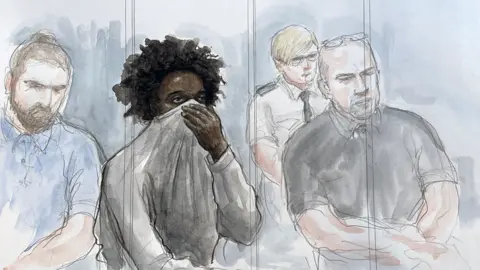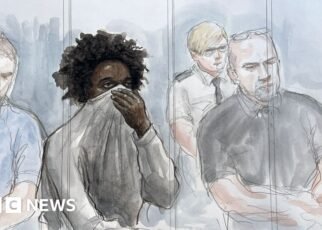[ad_1]
 Helen Tipper
Helen TipperThe most senior figures in government first became aware of the possibility of new charges against the suspect in the Southport murders in the past few weeks, the BBC has been told.
A spokesperson for the prime minister said it was “not correct” to say the government had been involved in withholding facts from the public.
It comes after the two candidates for the Conservative leadership said the government had questions to answer about the new charges.
Axel Rudakubana, 18 – who is accused of murdering three young girls in Southport in July – is facing two further charges, including one under the terrorism act.
He has charged with production of a biological toxin contrary to Section 1 of the Biological Weapons Act 1974.
He has also been charged with possessing a PDF document of a kind likely to be useful to a person committing to or preparing an act of terrorism, contrary to Section 58 of the Terrorism Act 2000.
The teenager had already been charged with the murders of three girls killed in Southport, as well as 10 counts of attempted murder and possession of a knife.
To charge someone under the Biological Weapons Act, the Crown Prosecution Service has to obtain consent from the government’s law officers – the attorney general or solicitor general.
The BBC has been told that in this case, consent was requested in recent weeks, and granted “within days”.
The teenager had been due in court in Liverpool for a pre-trial preparation hearing last Friday, 25 October.
That was postponed in order for all the charges to be dealt with together at Westminster Magistrates Court, where he will appear on Wednesday 30 October.
The charging decision and its timing were a matter for the CPS, a government spokesperson added.
It comes after the two candidates for the Conservative leadership raised questions about the new charges.
Robert Jenrick suggested that information was being “concealed” from the public.
“We were told for months that this was not a terror-related incident, and yet we have learnt that this individual, the suspect, was allegedly reading al-Qaeda manuals and had access to dangerous substances like ricin,” he said.
“Given the scale of public interest, I think it is an important question to be asked, why was this information not put into the public domain sooner? So I’m asking the public authorities and the prime minister, what did they know, when did they learn it, and why was the decision taken not to be more honest and transparent with the public.”
Meanwhile Kemi Badenoch has suggested there are “serious questions to be asked of the police, the CPS and also of Keir Starmer’s response”.
She has not elaborated on what those questions are, suggesting they should be asked in Parliament.
The police say it is “certainly not the case” that they have been keeping things from the public. It would be highly unusual for them to release details of a live police investigation.
The CPS suggest it has taken time to bring the charges because this was a “lengthy and complex investigation”.
 Merseyside Police
Merseyside PoliceThe new charges do not mean the Southport attacks are being treated as a terrorist incident.
Possessing a document that could be useful in preparing an act of terrorism is an entirely separate offence.
To be labelled as terrorism, the attack would have to be an attempt to advance a political, religious, racial or ideological cause. But it is not clear what possible motivation there might have been.
Authorities are urging people not to speculate, as it could jeopardise the entire court case.
Home Secretary Yvette Cooper said: “These additional charges will undoubtedly be distressing for people in Southport.
“The most important thing is to get justice for Bebe, Alice and Elsie and their heartbroken families, and all those affected by the attack and nobody should put that at risk.
“The police and prosecutors have an important job to do in their investigation, pursuing every avenue and taking the action they need to ahead of the trial.
“We must support them and ensure that everything possible is done to deliver justice.”
[ad_2]
Source link




